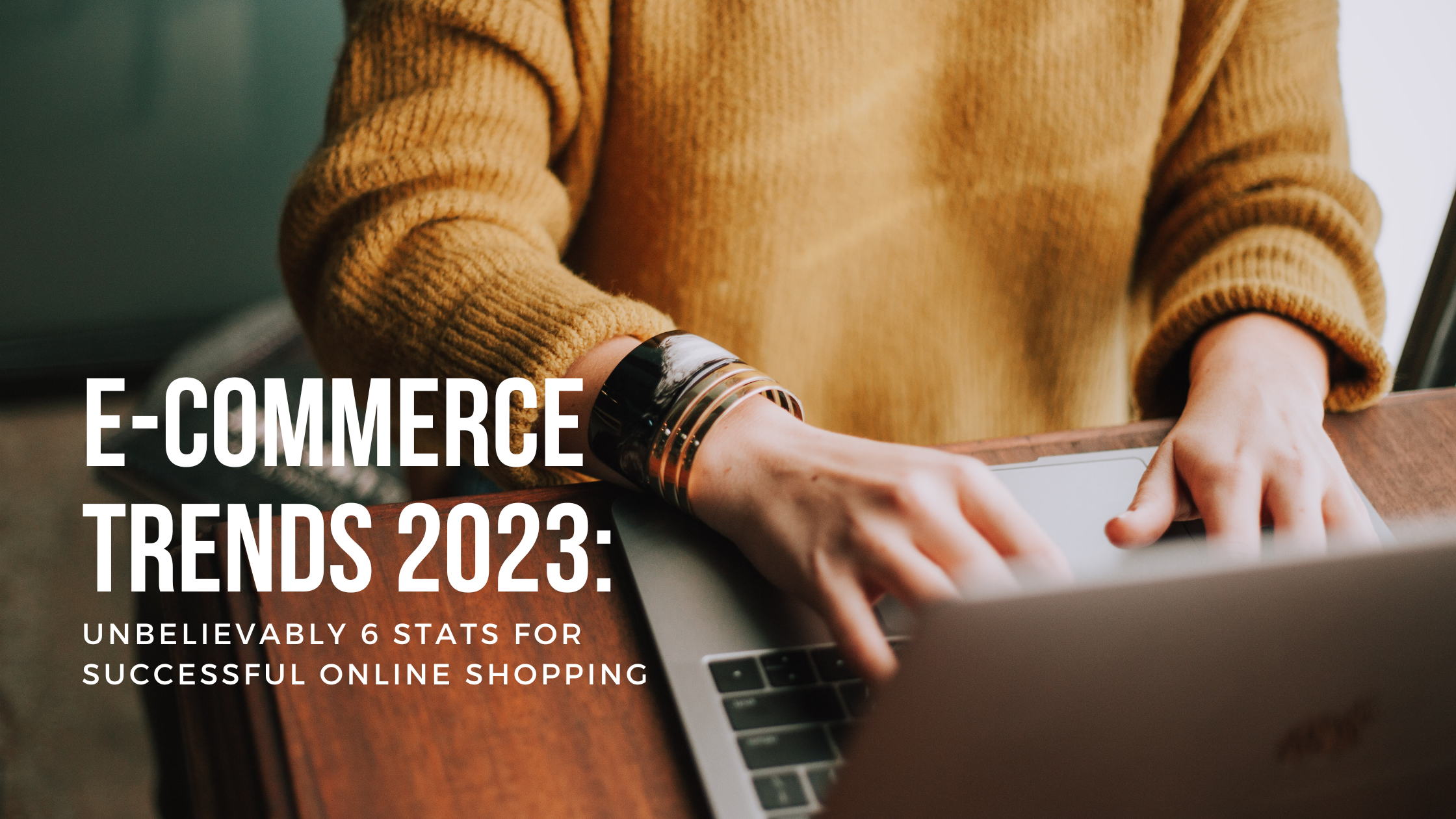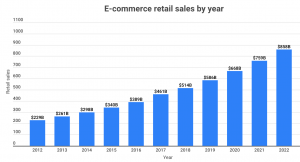
E-commerce trends 2023: unbelievably 6 stats for successful online shopping
25 November 2022
By Dipta
After more than two years of astronomical growth, what are the e-commerce trends online retailers can expect in 2023?
As shoppers return to brick-and-mortar stores, e-commerce habits take root. Experts predict that global retail e-commerce sales will grow from about $5 trillion to just over $8 trillion by 2026.
To capitalize on this growth, online retailers will need to double down on many of the trends that took off during the pandemic while keeping an eye on changing consumer expectations and preferences.
E-commerce trends 2023: Top 6 must-haves for online selling
So, what does it take to deliver stellar e-commerce in 2023?
1. As shopping returns to IRL, 2023 is the time brands need to optimize omnichannel
After two years of mostly online shopping, consumers are ready to embrace the brick-and-mortar experience. Brick-and-mortar stores are recovering as COVID restrictions are eased and face-to-face interactions are required.
“Online sales are still a bigger part of retail sales than they were before the pandemic, but they have been steadily declining since peaking in spring 2020,” said Nathaniel Meyersohn of CNN Business.

Details embedded in the 2023 e-commerce trends related to omnichannel include:
- Offer flexible shipping and return options (more on that below)
- Enable store staff to access customer account details to better serve you
- Ensure store inventory is reflected online in real time
- Invest in AR and other immersive technologies to create a more natural shopping experience online
For some businesses, buyers may have different expectations online than in-store. Find out how your customers like to shop and optimize the experience to best suit their needs.
Brands that deliver effective omnichannel shopping experiences will continue to thrive in 2023.
2. Mobile will be a big revenue driver for e-commerce in 2023
Have you noticed that as our devices get smaller, our expectations for them increase as well? Today, we spend record amounts of time online, and much of that time is spent shopping. It has been. But online no longer means “on a computer” we assume Gen Z rolling their eyes in unison as I type this.
For consumers, even in Generation Alpha, it is now the norm to always have a mobile phone with them.
Consumers continue to choose m-commerce as their preferred shopping channel. By 2024, global m-commerce retail sales are projected to reach approximately $4.5 trillion, accounting for 69.9% of total e-commerce retail sales.
Any brand that wants to stay in the game should embrace this mobile mentality. That means designing mobile-first experiences and not just shrinking desktop experiences to smaller screens. It also means making mobile payments easier by offering mobile-friendly payment options (such as Apple Pay and Google Pay).
3. Social commerce will dominate e-commerce trends in 2023
More and more brands are using social commerce to meet customers and sell there.
Consumers rely heavily on social feeds for shopping, suggestions, and simple e-commerce sales. According to one report, 48% of consumers are now likely to buy directly from TikTok.

Gen Z in particular uses TikTok more than Google for searching and product recommendations.
Global revenue from social media platforms is estimated at $992 billion in 2022, and social commerce revenue is projected to reach nearly $2.9 trillion by 2026.
Whether you sell directly through social media or not, don’t skip these channels in your e-commerce strategy.
Social commerce is essential for brands to reach their audiences and is expected to generate $30.73 billion in revenue by 2023, accounting for 20% of global e-commerce.
4. Sustainability contributes to business
Green trade is on the rise. Even in the midst of economic uncertainty, consumers want to pay more to buy from sustainable brands. 52% of consumers said the pandemic had raised concerns about sustainability.
Sites like Thrive that offer a greener shopping experience (from products to fulfillment practices) are gaining popularity, making circular economy strategies mission-critical for businesses that want to thrive. What does this mean for e-commerce in 2023?
Expect more brands to embrace the green side. For example:
- Selling products made from more sustainable materials
- Investing in greener packaging materials
- Allowing users to choose more sustainable shipping options (e.g. “I ship all of my items in one package for her instead of shipping them as soon as they arrive”)
- Make it easy for people to recycle or buy second-hand items on your website
5. Recommerce is spinning on the catwalk of 2023 e-commerce trends
By 2025, the fashion and apparel industry is expected to exceed $1 trillion. The fashion and apparel industry includes:
- Dress
- Wallet
- Bag
- Shoes
- Accessories such as jewelry
Recommerce will play a much bigger role when it comes to e-commerce trends in 2023 as sustainability becomes a key factor in brand buying decisions and when looking for cheaper shopping options.
65% of all buyers use resale or resell services.
Pioneers of the recommerce movement were companies reselling branded products (ThredUp, Poshmark, eBay, etc.), but it’s no longer just for third parties. Leading brands such as Patagonia, Levi’s and REI are focused on sustainability and recommerce efforts. After all, future generations want to shop with a purpose, and having a world left to live in is a huge motivating factor for them.
6. BOPIS: Flexible fulfillment is all the rage when it comes to e-commerce trends for 2023
Buy-Online Pick-Up-In-Stores (BOPIS) have been hugely popular during the COVID-19 lockdown, and shoppers aren’t ready to give up when businesses reopen. BOPIS offers consumers the opportunity to shop online and arrange for in-store pickup.
Globally, BOPIS is expected to be a $703 billion market by 2027.

Flexible fulfillment is nothing new – Major retailers like Target have invested heavily in this aspect of fulfillment and the customer experience for over seven years, offering We offer shipping and BOPIS (buy online, buy in-store) options. BOPIS makes fulfillment convenient for customers and helps increase loyalty and sales. It is expected to gain momentum in 2023 as consumers look for ways to keep buying the products they love when budgets are tight.
The Takeaways
Customer Experience is an Ongoing Ecommerce Trend for 2023
As you build your e-commerce strategy for 2023, keep the following in mind:
Customer-centric experiences are a trend that never fails. When in doubt, ask yourself, “What do my customers want?” Then it will stand the test of time.
A recent survey of digital executives shows where e-commerce is headed. If you want to build a safe and secure e-commerce website, Lime Commerce is here to help you with over eight years of experience delivering excellence for our clients. Talk to us about your business needs and how we can help.
